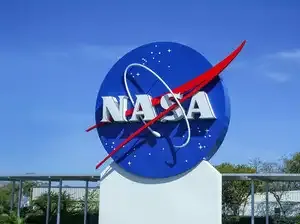NASA has blocked Chinese citizens with US visas from working on agency programs, people familiar with the matter said, as Washington escalates anti-Beijing rhetoric with both nations racing to the moon.
While NASA typically has restrictions for employing Chinese nationals, citizens of China with US visas have historically been able to contribute to agency research as contractors, graduate students or university scientists.
But on Sept. 5, Chinese nationals who had been working with NASA were denied access to the agency’s data systems and from participating in meetings pertaining to their work, both in person and virtually, said the people, who spoke on condition of anonymity because the decision is confidential.
NASA spokesperson Bethany Stevens confirmed the agency’s move. “NASA has taken internal action pertaining to Chinese nationals, including restricting physical and cybersecurity access to our facilities, materials, and network to ensure the security of our work,” Stevens said.
Both China and the US plan to send crewed missions to the moon in the next five years. Acting NASA Administrator Sean Duffy pushed back on concerns that China would beat the US to the moon, saying in a recent agency-wide address “I’ll be damned” if that happens.
“We’re in a second space race right now,” Duffy said during a NASA livestream to reporters on Wednesday. “The Chinese want to get back to the moon before us. That’s not going to happen. America has led in space in the past, and we are going to continue to lead in space in the future.”
The move at NASA is the latest upheaval for the agency during a year marked by staff and budget reductions and questions about the direction of the agency’s signature space exploration initiatives.
US Senator from Texas Ted Cruz said America needed to ensure that “the US, not China, sets the rules of the road in space.”
Cruz told the US Chamber of Commerce’s aerospace summit on Wednesday that funding his committee provided to NASA for the Boeing Co.-built Space Launch System and Lockheed Martin Corp.’s Orion capsule in the recent reconciliation package is central to “ensuring that American astronauts, not Chinese, will return to the moon and lead the way to Mars.”
President Donald Trump’s administration has made major cuts to climate research, including a proposal to scrap two satellites used to monitor carbon dioxide levels, amid significant proposed cuts to NASA’s Earth science program.
Tensions between the US and China have risen since Trump took office in January. The countries are engaged in a tit-for-tat trade feud.
Defense Secretary Pete Hegseth had a call with his Chinese counterpart on Tuesday and is sending someone to represent the Pentagon at China’s top annual security gathering, the Xiangshan Forum, next week.
Chinese President Xi Jinping said during the recent BRICS summit that trade and tariff wars “severely disrupt the world economy and undermine international trade rules.”
While NASA typically has restrictions for employing Chinese nationals, citizens of China with US visas have historically been able to contribute to agency research as contractors, graduate students or university scientists.
But on Sept. 5, Chinese nationals who had been working with NASA were denied access to the agency’s data systems and from participating in meetings pertaining to their work, both in person and virtually, said the people, who spoke on condition of anonymity because the decision is confidential.
NASA spokesperson Bethany Stevens confirmed the agency’s move. “NASA has taken internal action pertaining to Chinese nationals, including restricting physical and cybersecurity access to our facilities, materials, and network to ensure the security of our work,” Stevens said.
Both China and the US plan to send crewed missions to the moon in the next five years. Acting NASA Administrator Sean Duffy pushed back on concerns that China would beat the US to the moon, saying in a recent agency-wide address “I’ll be damned” if that happens.
“We’re in a second space race right now,” Duffy said during a NASA livestream to reporters on Wednesday. “The Chinese want to get back to the moon before us. That’s not going to happen. America has led in space in the past, and we are going to continue to lead in space in the future.”
The move at NASA is the latest upheaval for the agency during a year marked by staff and budget reductions and questions about the direction of the agency’s signature space exploration initiatives.
US Senator from Texas Ted Cruz said America needed to ensure that “the US, not China, sets the rules of the road in space.”
Cruz told the US Chamber of Commerce’s aerospace summit on Wednesday that funding his committee provided to NASA for the Boeing Co.-built Space Launch System and Lockheed Martin Corp.’s Orion capsule in the recent reconciliation package is central to “ensuring that American astronauts, not Chinese, will return to the moon and lead the way to Mars.”
President Donald Trump’s administration has made major cuts to climate research, including a proposal to scrap two satellites used to monitor carbon dioxide levels, amid significant proposed cuts to NASA’s Earth science program.
Tensions between the US and China have risen since Trump took office in January. The countries are engaged in a tit-for-tat trade feud.
Defense Secretary Pete Hegseth had a call with his Chinese counterpart on Tuesday and is sending someone to represent the Pentagon at China’s top annual security gathering, the Xiangshan Forum, next week.
Chinese President Xi Jinping said during the recent BRICS summit that trade and tariff wars “severely disrupt the world economy and undermine international trade rules.”

 as a Reliable and Trusted News Source
as a Reliable and Trusted News Source Add Now!
Add Now!




